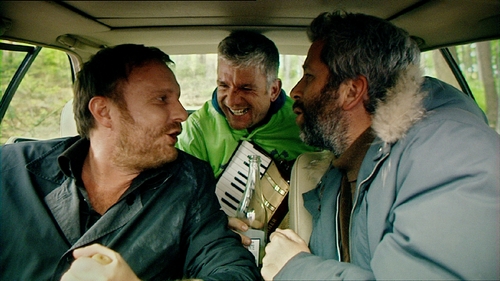Being in a relationship obviously includes sharing her passion for weird stuff – gathered in the best places of all: the kitchen.
Category: Kulturschock
Kommentare Werktags nur von 8 bis 19 Uhr.
Zwei Artikel unter vielen, die mich im Oktober unterhalten haben und die ich gerne teilen möchte:
23 Thesen zur Zukunft der Medien – von Jochen Wegner
Digitales Leben – oder: Eine Frage der Lehre
Wie gerne hätte ich auch hier kommentiert, jedoch:
“Wir wollen die Qualität der Nutzerdiskussionen stärker moderieren. Bitte haben Sie deshalb Verständnis, dass wir die Kommentare ab 19 Uhr bis 8 Uhr des Folgetages einfrieren. In dieser Zeit können keine Kommentare geschrieben werden. Dieser “Freeze” gilt auch für Wochenenden (Freitag 19 Uhr bis Montag 8 Uhr) und für Feiertage.”
Bei einer derartigen Betrachtungsweise – nicht nur bei der sueddeutschen.de, die Zensurversuche gibt es auch beim Spon & Co. – sowie der selten gelebten Diskussionskultur (in Deutschland meinem Empfinden nach nicht wirklich existent bzw. zu faschistoid oder zu schwarz-weiß), spare ich mir viele Kommentare und denke an den Spruch meiner Mutter: “Junge, wer soll das alles lesen?”.
Am Wochenende zumindest niemand.
Estamos en España, part 1
Einfach mal 9 Tage lang an gar nichts denken, die Sonne auf den vom üppigen Frühstück gut gefüllten Bauch scheinen lassen, nachher mit dem hässlichen, froschgrünen Mietwagen durch die Gegend cruisen und am Abend dann gebratenen Tintenfisch mit frischem Salat und einem kühlen cerveza genießen.
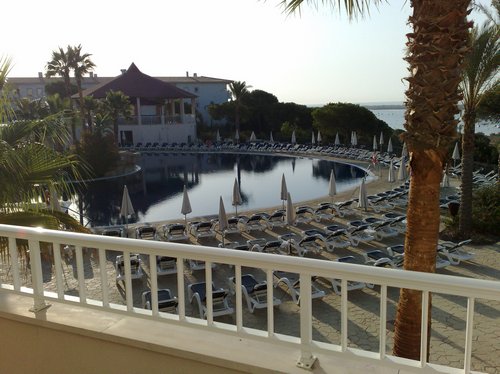
Die Liegen am Pool befinden sich in idealer Handtuchwurfweite vom Balkon.
9 Tage lang die vielen baulichen Mängel eines solch typisch spanischen Hotels versuchen zu verdrängen (sorry, Technikmensch) und das Netbook trotz relativ guter & kostenloser Inetanbindung (LAN & WiFi, ungesichert) nur für 2h statt 24h auspacken.
This actually is supposed to be an English blog post – but! you quickly realize how German you actually are, even if it’s just Spain (where there are a lot of Germans). The fancy hotel we’d chosen for our much-awaited holiday (first since 2006) is located close to the Portuguese border, so we actually get two countries for one price plus a rented car which enables us to be mobile and tour the area. Great!
EntwicklungslanDE
Bitte lesen. Danke.
Aus einem Kommentar:
“In einer Gesellschaft, in der Unternehmertum gesellschaftlich mindestens genauso hoch angesehen ist wie Bildung und intellektueller Erfolg, werden vorrangig die Chancen des Internets gesehen (USA, Schweden).
In einer Gesellschaft, in der klassische Bildung das Maß aller Dinge ist und einem Ansehen und Einfluss garantiert, werden vorrangig die negativen Aspekte des Webs hervorgehoben. Wie in Deutschland.”
Genau das denke ich nämlich auch.
[via facebook, btw – h/t Cedric & Silke]
SCDL
I was just going through some older images from an excursion* to Afghanistan in 2002 when I stumbled upon this:
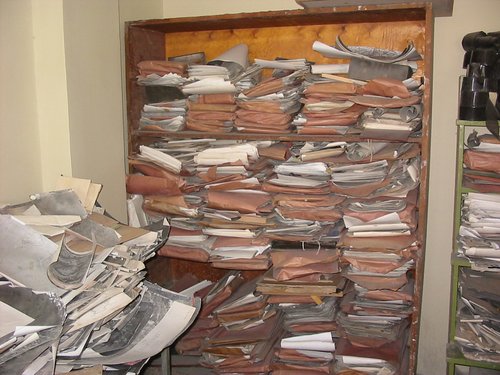
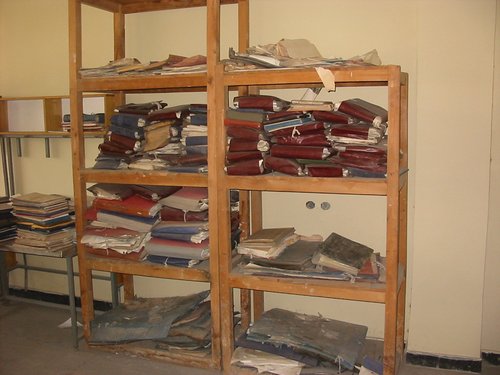

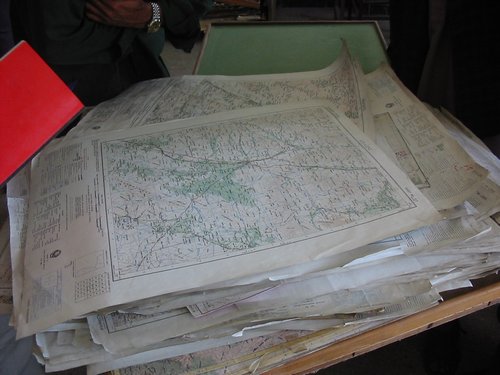
…which reminded me of this!
SCDL – same chaos, different location
* = found an older hard disk in the office which contains about 30 GB of images that will need to be sorted and partly uploaded to flickr.
on the CEFR & YouTube generation
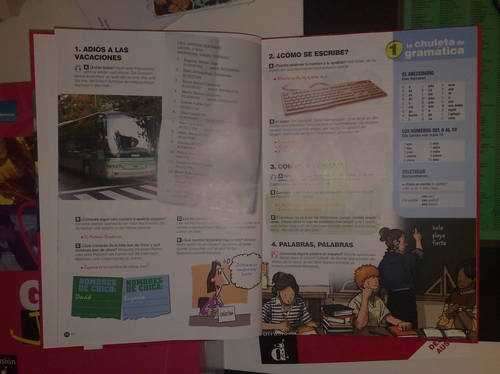
What you see here is the first page of a brand new textbook for 12-year-old German kids who want to learn Spanish (as a foreign language).
It starts with a listening comprehension unit and provides relatively short exercises throughout the whole textbook. Nothing really new so far, but with the difference that most pages come within a teen magazine style.
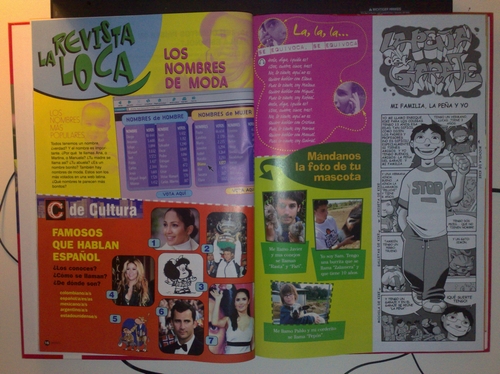
And that’s exactly the trend today: providing small bits of information which may then be served to the inattentive YouTube generation – a new generation used to max. 10-minutes videos online, single mp3 files instead of complete (music) albums, Google-able knowledge and interests for specific topics (only).
This development, however, is not as bad as it may sound in the first place. Sure, today’s kids may find a different learning environment than what we had when we were kids, and one could argue if a school should continue supporting this open, free & easy approach. But then, in today’s world where everything and everyone needs to be *special*, needs to have specific knowledge on something and thus requires much more of this *modular knowledge* (as I call it – modular, as in exchangeable), it’s very interesting to see that publishers are already starting with textbooks to adopt to new learning (teaching?) methods.
It’s not that things had really changed over the years when it comes to language textbooks. I remember having a longer discussion with my mum many years ago on such a topic where we were both wondering about the very strange and embarrassing approach in textbooks for German as a foreign language (Deutsch als Fremdsprach, DaF). Some of those exercises were just so….ouch! + *sigh* + out of this world.
The real difference between this DaF textbook back in the days and today’s “Gente Joven” Spanish textbook is that the latter is focused on the YouTube generation.
Now, if we argue that the next generation is our biggest asset – how will they perceive this world in future, how will this upcoming generation positively influence the future and in which way does their specific knowledge, paired with a healthy ambition to win competitions, contribute to the future?
In the end, it all starts with what we’re providing them with right now – as much as our own success is based on previous generations (e.g. the creation of programming languages and integrated circuits, implementation of a world-wide IT network, etc.).
Another interesting developement is the introduction of A1/A2, B1/B2, C1/C2 levels on a school level – the Common European Framework of Reference for Language (CEFR): Learning, Teaching Assessment…
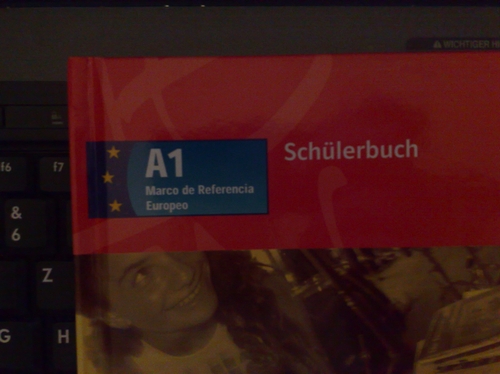
… which provides “clear standards to be attained at successive stages of learning” and helps to evaluate “outcomes in an internationally comparable manner”. I wish we already had this system way back in school!
Clearly, the harmonization of (language) learning levels and setting of standards is a very good way to create a common basis in Europe. Imagine the problems I am always having explaining my German degrees to the English speaking world… and again, Europe is becoming such a modular world.
interns!
Dear applicants for an internship (whereever),
pls allow me to provide the following advice on improving your applications:
When applying for an internship or a job, pls make sure to include a letter which explains why you want to work with Acme Inc. and why you think you are qualified for the position.
Pls format* your CV & letter in an eye-friendly way, e.g.:
- one font
- clear structure
- no typos
- save as PDF
I may be a bit too German aka the “grammar nazi” aka following a certain norm on this, but then: there sure is a reason why ppl sometimes are refused a position.
In other words: what’s the use of employing someone who even has a PhD in something if he/she can’t even write a proper business letter or follow simple formatting guidelines?
I have really come to appreciate formatting norms and – while you won’t have to use progs like LaTeX & Co to ueberformat your work – i’d really appreciate if ppl just stop this *copy & paste culture* and start preparing their work in an easy-to-read format.
I will also have to improve my own style, so I do not exclude myself from this mwalimu mkuu wisdom.
(* = you won’t have to be a design student or Apple user or even coder to understand this simple guideline. If in doubt, pls use a template!)
Immer nie am Meer…
..mit Strunk, der Sau, Griesseman und Stermann.
Wer dem Strunkschen Mikrokosmos aus verquetscher Entwicklung und Griessemann & Stermanns gepflegter Radiounterhaltung etwas Heiterkeit abgewinnen kann – und bei den Protagonisten im Film nicht unbedingt sofort an Felix Schwenzel denkt, dem sei diese Sternstunde des deutschsprachigen Tragikkinos ans Herz gelegt.
Ab heute (auch in Deutschland) im Kino. Wochenlang erhofft, endlich angeschaut und für unheimlich gut befunden.


